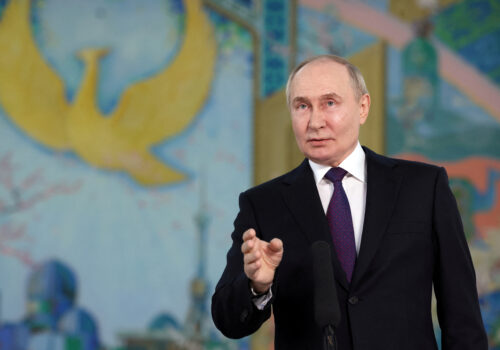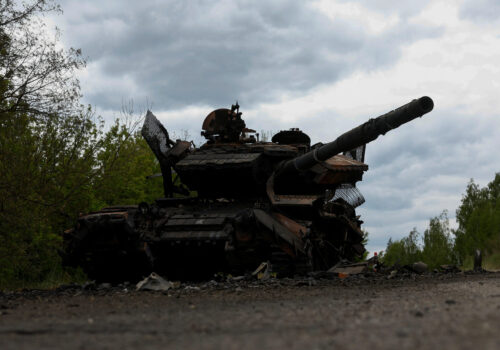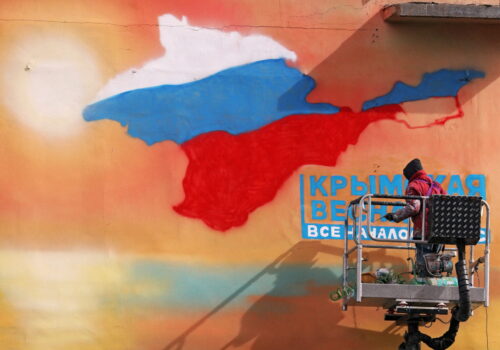Almost two and a half years since the start of Russia’s full-scale invasion, the Kremlin still retains the ability to shock with the scale of its crimes. On June 8, the targets were Ukrainian children. Not just any children, but kids being treated for cancer, whose daily lives were already full of fear and pain.
The exact number of dead and wounded as a result of Russia’s targeted missile strike on the Okhmatdyt Children’s Hospital in central Kyiv has not yet been confirmed. Nor is it possible to calculate the death and suffering that will result from lack of treatment due to the partial destruction of what is Ukraine’s biggest pediatric clinic.
In the immediate aftermath of the attack, large numbers of distressed and in some cases injured children lined the pavement around the ruins of the wrecked hospital, many still attached to drips. Providing them with the specialized medical support they so urgently require will now be extremely difficult.
Doctors were also among the victims. Those killed in Monday’s missile strikes included thirty year old Svitlana Lukyanchuk, a nephrologist from Lviv. Svitlana was an orphan who overcame challenging personal circumstances to qualify as a doctor. She dedicated herself to saving children’s lives, but will never now experience the joy of motherhood herself.
Okhmatdyt Children’s Hospital was one of three separate Ukrainian medical facilities to be struck by Russian missiles on July 8. One such attack could potentially be attributed to human error or explained as a tragic mistake. Three targeted attacks on the same day suggests a deliberate Russian strategy to destroy Ukraine’s healthcare infrastructure, just as the Kremlin has already targeted and destroyed much of Ukraine’s civilian energy infrastructure. Moscow appears intent on making large parts of the country unlivable.
Stay updated
As the world watches the Russian invasion of Ukraine unfold, UkraineAlert delivers the best Atlantic Council expert insight and analysis on Ukraine twice a week directly to your inbox.
It is no doubt hard for many outside observers to fully appreciate that such horrors are taking place in the heart of twenty-first century Europe. After all, just three years ago, it would also have been difficult for most Ukrainians to believe such things were possible. Sadly, that is no longer the case.
As a result of Russia’s February 2022 invasion, Ukrainians have been confronted by an astonishing array of war crimes that recall the worst excesses of bygone eras. Entire cities have been reduced to rubble. Hundreds of thousands have been killed, abducted, or subjected to forced deportation. Large numbers of vulnerable children have been sent to Russian indoctrination camps and robbed of their Ukrainian heritage. In regions of Ukraine under Kremlin control, all traces of Ukrainian identity have been ruthlessly erased.
The evidence of Russian war crimes is now so overwhelming that the International Criminal Court in The Hague has issued arrest warrants for Vladimir Putin himself and many of his most senior officials. Nevertheless, the nightmare continues. A genocide is being live-streamed to the watching world, but Western leaders choose not to call it by its name for fear of being obliged to act.
Today’s Russia did not become a rogue regime overnight. On the contrary, the crimes we are now witnessing reflect unresolved historic issues that have been allowed to fester since the early days of Putin’s reign. Unlike all other European empires, post-Soviet Russia never rejected imperialism and was not forced to confront the crimes of the imperial era. This has allowed for a revival of Russia’s imperial identity and has helped fuel a sense of impunity that directly paved the way for the invasion of Ukraine.
Rather than address the growing threat posed by Putin’s Russia, the Western world has consistently sought to avoid confrontation. When a newly anointed Putin crushed Chechnya, Western leaders chose to look the other way. After he invaded Georgia, they scrambled to reset relations and return to business as usual.
Inevitably, this approach only emboldened the Kremlin. The West’s weak response to the 2014 seizure of Crimea led directly to Russian military intervention in eastern Ukraine. When this, too, failed to produce a decisive reaction, the stage was set for today’s full-scale invasion.
Even now, Western policy remains defined by a reluctance to provoke Putin, with Western leaders hopelessly preoccupied by fears of escalation. This has left Ukraine unable to adequately defend itself, while encouraging Russia to escalate further. As a result, we are now closer to a major global war than at any time for a generation.
It is delusional to think Russia can be stopped by appeasement, concessions, or compromise. Any ceasefire would merely provide the Kremlin with a pause to rearm before resuming the campaign to wipe Ukraine off the map entirely.
Nor are Putin’s imperial ambitions limited to Ukraine alone. He has repeatedly portrayed the invasion of Ukraine as part of a sacred mission to correct the historical injustice of the Soviet collapse and “return” historically Russian lands. If Putin achieves his goals in Ukraine, he will inevitably look to press home his advantage and “reclaim” other countries that were once part of the Russian Empire. The list of potential targets is long and includes Finland, Poland, the Baltic States, Belarus, and Moldova. The only way to guarantee their security is by defeating Russia in Ukraine.
Western leaders now have a simple choice: They can provide Ukraine with the support necessary to defeat Russia, or they can prepare to face the Russians themselves in the near future. With every day of delay, the cost of stopping Putin grows. At the moment, it is the Ukrainians alone who are paying this terrible price. However, until Russia is beaten, nobody in the West can take their security for granted. Instead, the threat will only increase.
Ten years ago when the Russian invasion of Ukraine first began, a cautious Putin deployed Russian soldiers without identifying insignia in an attempt to mask his aggressive actions. A decade later, he is now bombing children’s hospitals in the center of a European capital city while his priests and propagandists preach holy war against the West. Clearly, he will not stop until he is stopped.
Vladimir Putin represents the greatest threat to European peace since Adolf Hitler. Today’s generation of Western leaders should recall the lessons of that earlier era before it is too late. They must reject the appeasement of the 1930s and embrace the mantra of “never again” that rose from the ashes of World War II. Until that happens, the Kremlin’s crimes will continue to escalate.
Serhiy Prytula is a Ukrainian volunteer fundraiser and founder of the Prytula Charity Foundation.
Further reading
UkraineAlert
Jun 4, 2024
Vladimir Putin just tacitly admitted Crimea is not really part of Russia
By
Peter Dickinson
UkraineAlert
May 30, 2024
If the West wants a sustainable peace it must commit to Ukrainian victory
By
Hanna Hopko, Andrius Kubilius
UkraineAlert
Jun 12, 2024
Ukraine is making the Russian occupation of Crimea untenable
By
Olivia Yanchik
The views expressed in UkraineAlert are solely those of the authors and do not necessarily reflect the views of the Atlantic Council, its staff, or its supporters.

The Eurasia Center’s mission is to enhance transatlantic cooperation in promoting stability, democratic values and prosperity in Eurasia, from Eastern Europe and Turkey in the West to the Caucasus, Russia and Central Asia in the East.
Follow us on social media
and support our work
The post The Kremlin’s crimes will continue to escalate until Russia is defeated appeared first on Atlantic Council.
The post The Kremlin’s crimes will continue to escalate until Russia is defeated first appeared on The News And Times Review – NewsAndTimes.org.





